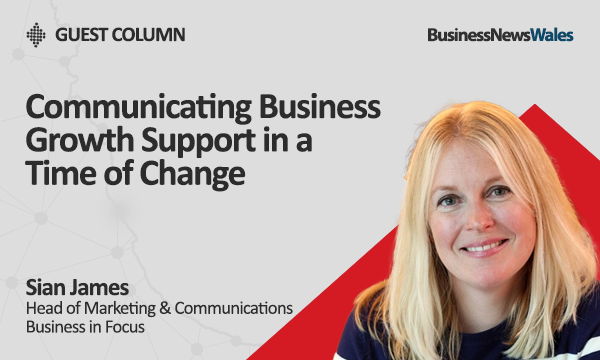Over the next year, the business support landscape will continue to shift, but one thing remains clear, business support can only be effective if it is seen, understood, and trusted.
In the current economic climate, communication isn’t just a supporting function, it’s a strategic asset. It acts as the vital bridge between essential business support services and the people and communities that need them most.
Across Wales, small and micro businesses are facing a perfect storm of rising costs, political change, and shifting models of support provision. Against this backdrop, how we communicate and not just what we deliver, becomes central to the impact we can make.
Support services only drive meaningful outcomes when they are understood, accessible, and trusted. In times of transition, achieving this becomes more complex and more critical.
Effective marketing and communications must be built on relevance, clarity, and trust. Content must reflect the real and immediate concerns of business owners and entrepreneurs.
Messaging must be free from jargon, easily digestible, and action-oriented.
Consistency, transparency, and empathy are essential in building relationships that convert awareness into action.
These principles aren’t just about presentation, they are about access. The way support is communicated directly influences who engages, who benefits, and ultimately, who thrives.
Strategic communications shape behaviour. They determine whether an entrepreneur in a rural area sees a service as relevant to them. They influence how a founder experiencing self-doubt responds to a programme offer, and they play a key role in reaching underrepresented groups whose needs have historically been overlooked.
Insights gathered from delivery teams, advisors, and the businesses themselves must inform every campaign and communication. Understanding the barriers and behaviours of different business communities enables the development of tailored strategies, ensuring that messages reach people with meaning.
In practice, this means refining messaging in response to regional economic pressures, adjusting formats to increase accessibility, and using hyper-local distribution channels to amplify authenticity.
It means taking the time to understand what tone, visual style, and language best resonate with each audience.
By embedding lived experience into content and storytelling, we can elevate real voices, from female founders and emerging entrepreneurs to rural tradespeople and digital innovators. Inclusive communication builds more than awareness, it builds trust and a sense of belonging in the economic ecosystem.
In my experience, marketing and communications are often seen as the final step in programme delivery, the means to broadcast what’s available. But when deployed strategically, they become a key part of the delivery itself. They unlock participation, enable access, and contribute to outcomes.
As Wales continues to navigate its economic transition, our communications strategies must evolve in line with the changing landscape. That means staying agile, informed, and deeply connected to the communities we serve.
Over the next year, the business support landscape will continue to shift, but one thing remains clear, business support can only be effective if it is seen, understood, and trusted.





